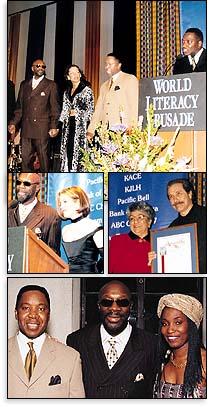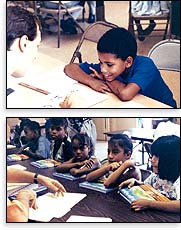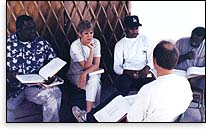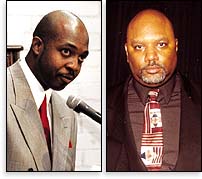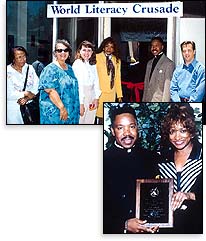

Rising from the
ashes of the 1992
riots, a back-room
tutoring project in
Compton has grown
into a global
campaign against
illiteracy, gaining
ground and support
with its results.

n April 1992, millions watched in alarm as fires erupted throughout Los Angeles, marched toward their neighborhoods and blackened the sky. For many citizens at that time, the social issues underlying the unrest paled in comparison to immediate concerns of personal survival. And, in the aftermath, the event seemed to many to be more like a bad dream than harsh reality. In at least one respect, it also ended like one: Life went on.
Yet for many others close to the core of the riots in South Central Los Angeles, the issues which sparked the violence were a powder keg waiting to explode again.
Violent crime rates were also at an all-time high in South Central, escalating since the 1970s. Hardly a day passed without news of another eruption of violence, murder, aggravated assault or robbery, much of it gang related.
Thus, Compton Baptist minister Rev. Alfreddie Johnson felt a sense of urgency about isolating and eradicating the root cause of the unrest and crime in his South Central community.
“I had already spent the better part of my lifetime trying to effect positive change,” he says. “But while I repeatedly went into battle, I faced an enemy that I could not see.”
...........................
With L. Ron Hubbard’s Study Technology, Johnson was given his weapon against illiteracy. Combined with tutoring on basics such as phonics, the illiterate could learn how to learn and empower themselves for life.
...........................
|
|
In the wake of the riots, Johnson walked the streets of South Central, knocked on doors and spoke to community leaders and residents.
Before long, the enemy was driven into sight: Illiteracy. Recognizing how insidious was the inability to read and write, and thus to learn and raise ability and self-esteem — not to mention opportunity and employment — Johnson was somewhat daunted. “I didn’t have a weapon with which to slay it,” he says.
But in 1992, at the home of Compton community leaders Fred and Marcine Shaw, Johnson was introduced to breakthrough educational materials known as the Study Technology.
Researched and developed over a period of four decades by American author and humanitarian L. Ron Hubbard, Study Technology explains the exact barriers that prevent a person from being able to learn and to apply what he has learned, and precise steps to overcome those barriers. It teaches a person how to study and learn, resulting in the ability to fully comprehend any subject and to apply it. Developed in the 1960s to help students of the Scientology religion, founded by Mr. Hubbard, Study Technology enjoys wide use by groups and individuals from all walks of life.
With the Study Technology, Johnson says he was given his weapon. Combined with tutoring on basics such as phonics, the illiterate could learn how to learn and empower themselves for life.
Tribute Marks Success
Today, Rev. Johnson has not only long since squared off with his nemesis of illiteracy, but he is vanquishing it on a daily basis around the world — and with growing recognition and support.
The World Literacy Crusade (WLC) he founded in Compton in 1992 with community leaders, ministers, parents, youth and educators, celebrated its seventh anniversary this year with a benefit concert for literacy held at the Wilshire Ebell Theater. Assisted by volunteers from Churches of Scientology and other denominations and community groups, the WLC today has literacy projects operating in inner cities across the United States as well as in Australia, New Zealand, Malaysia, Britain, Ghana and Canada.
The fundraising event, which included Isaac Hayes’ annual Celebrity Salute to Rev. Dr. Martin Luther King Jr., was co-chaired by Hayes, the legendary composer, musician and actor who is also the international spokesperson for the WLC, and by WLC patron Lisa Marie Presley.
Emceed by Dawnn Lewis (Different Worlds), the evening featured jazz musicians Jonathan Butler and Ronnie Laws, gospel greats Rev. Calvin B. Rhone and Michael Speaks, and actor and performer Carl Anderson, as well as readings from the works of Dr. King by Ernest Thomas (What’s Happening) and R&B artist Maxwell.
Actor and community activist Edward James Olmos was an honored guest and recipient of the WLC’s Spirit of the Community Award, presented to individuals for outstanding contributions to solving social ills. Olmos was recognized for his numerous efforts to improve the quality of life in urban communities.
Among the 1,200 guests were numerous individuals who have experienced firsthand or witnessed the results of the WLC.
WLC’s Vice President and Deputy Executive Director Ed Haynes reported that the results of this year’s fundraiser, sponsored by a variety of individuals and groups including Applied Scholastics International and the Association for Better Living and Education (A.B.L.E.), will enable them to give more assistance to fledgling projects in some of the most troubled inner cities in the U.S. and abroad.
“Monumental Task”
The support from community and social leaders is also a strong message of encouragement for WLC founders and leaders in accomplishing their broader mission, which extends beyond illiteracy to its consequences in society.
“This is not just about tutoring. Our purpose is to eliminate poverty, ignorance, disease, crime and hopelessness by establishing and restoring literacy and learning. That’s a monumental task,” admits Johnson, who serves as executive director and CEO of the WLC.
Statistical information published by the Educational Testing Service as a result of a four-year study revealed that by the end of 1993, 23 percent of adults in the United States — more than 44 million people — were illiterate. Another 50 million — 26.2 percent of the adult population — were at the second lowest level of literacy. More recent studies show no improvement, and the statistics are repeated in countries around the world.
After Johnson discovered Study Technology in 1992, he teamed up with Deputy Sheriff Fred Shaw, Jr., who retired from law enforcement to dedicate his life to the literacy crusade and now serves as WLC president. With a handful of friends and associates in Compton, they acquired an empty store and a couple of volunteer tutors from Applied Scholastics, which spearheads the instruction and use of Mr. Hubbard’s Study Technology world wide.
They started tutoring friends’ sons and daughters who were having difficulty in school, including many who had been involved in gangs. More children as well as adults joined the Saturday sessions, and to keep up, Johnson arranged to provide tutoring for certain days of the week after school.
Support for the project snowballed, with more tutors joining the effort, along with assistance in the form of materials, furnishings and other donations.
As the first students realized results from the tutoring, word of the program’s success spread like wildfire.
“People started coming from all over. They recognized what we also realized — that we are providing the missing ingredient in today’s educational institutions,” he says. “We are teaching people how to learn.”
The results of the Compton Project have been overwhelmingly positive, and, in many cases, miraculous. (See also “Changing Lives for the Better”.)
Reaching Out
More than 1,300 individuals have completed the literacy program at the Compton Project since its inception. Hundreds more have received tutoring assistance. More than 100 tutors who have been trained at the Project have since gone on to mentor children and help family and friends.
Projects have been started in inner city locations in Chicago, New York, Boston, Columbus, Memphis, Seattle, Portland, Sacramento, San Diego, Orlando and other cities in the U.S., and as far abroad as New Zealand.
...........................
“I’ve seen that program and it works. It really works. I literally watched the changes. Kids take pride in themselves for the first time.... This has been a major impact on the entire community in terms of literacy.” — Colleen Davis, vice principal
...........................
|
|
And in Los Angeles, by 1996, the local demand for the WLC’s services had surpassed the facilities and capabilities of the single Compton project.
So with the strong support and consultation of several community and political leaders, Johnson and Haynes took “the Compton Project” to others in LA.
Working in partnership with a wide variety of private groups and businesses as well as public departments throughout LA County, the WLC provides the basics of tutor and mentor training to a core group at each locale, from which are developed two or three who become the leaders for that activity. Those leaders in turn receive further training in Compton. Through partnerships with community groups, volunteers also provide tutoring and mentoring to residents on location in several housing projects.
The WLC also took their program to schools. At Will Rogers Elementary School in 1996 and 1997, vice principal Colleen Davis, now vice principal at Lindbergh Elementary School, saw observable results the volunteers achieved with Study Technology.
“I’ve seen that program and it works. It really works,” Davis told Freedom. “I literally watched the changes. I remember two little boys — twins — just driving their teacher crazy. I saw them go through the tutoring program. They changed completely. Their self-esteem went up 100 percent once they learned how to read. They were on Ritalin and were taken off.
“I’ve seen identical results with all students. Kids take pride in themselves for the first time. And once you can read, that gives you a ship you can sail all over the world. The students begin to know that,” says Davis.
The WLC volunteers tutored at the school four days a week from 9 in the morning to noon. “Kids would get there starting at 7:30, 8 o’clock in the morning, waiting to start. It made a difference in all those children’s lives, and they knew it,” Davis said.
At Will Rogers, about 150 students went through the tutoring program. The same program was started at Lindbergh Elementary.
Reaching a city the size and diversity of Los Angeles requires multilingual tutors and materials, and other factors from transportation to fundraising.
Ed Haynes has been the organizational man behind the WLC’s expansion since 1995. He was introduced to L. Ron Hubbard Study Technology in Miami and started a local learning project early that year. As advisor and chairman of the board for Miami-based Concerned African Women (CAW), an international social action group founded by Kiani Nesbitt with co-founders Thema Campbell and Latrisha Brazela, his administrative and organizational experience showed. The Miami project, run in conjunction with CAW, boomed.
The results were even more than Haynes had imagined. “I knew I had found the answer that would open the door to solving virtually every social concern of the African people,” he says. “Because here was a technology that could put people into a position where they are able to solve their own problems, and control their future and their fate.”
When Rev. Johnson learned of Haynes’ success at building the Miami project, he asked Haynes to spend some time in Los Angeles to organize the LA activities and the WLC headquarters. Haynes obliged, and spent the next two years traversing the country between LA and his Miami home, where his wife and two daughters remained. By mid-1997, Haynes became the Deputy Executive Director and Vice President of the World Literacy Crusade. He re-established his roots in Los Angeles and moved his family here in June 1998. His wife, Adriene, now serves as the Establishment Officer at the WLC.
Making Goals
The tutors and the tutored alike who have been through the WLC program in Los Angeles since its start as a Compton storefront operation in 1992 have created a ripple effect throughout the county.
The broader community is further being reached by tutoring the parents of the tutored. When they, too, know Study Technology, not only can they help their children, but they raise their own education levels.
“This has been a major impact on the entire community in terms of literacy,” Davis told Freedom.
In tandem with the actions of community outreach programs, gang peace negotiators, increased police presence, and actions of churches such as Cecil “Chip” Murray’s First AME Church, the results are also tangible in statistics.
Since 1993, the rate of violent crime in South Central has declined: Murders dropped by nearly 25 percent in 1994 and by another 23 percent in 1995. The 77th Street Police Division, which covers much of South Central, saw a 42 percent decrease in murders during that time. The rates have continued decreasing, with the South Bureau, which covers an area from the harbor to South Central, reporting a drop in murders of nearly 40 percent between 1997 and 1998. And while the South Bureau saw 428 homicides in 1993, 1998 ended under 120 — an overall drop of 72 percent.
Seeing their own results contribute to such changes in the community spurs on Johnson and other WLC leaders despite the magnitude of their job.
“One by one, we have to keep reaching people. It is a matter of numbers. We have the answer to illiteracy in the Study Technology. Now we just need enough projects and enough tutors,” says Haynes.
Through such individual efforts, the World Literacy Crusade, day by day, is realizing its star-high goals.
“Martin Luther King Jr.’s dream of freedom and equal opportunity for all races is now possible through the efforts of the World Literacy Crusade and the use of the effective social betterment technologies of L. Ron Hubbard,” said international spokesperson Isaac Hayes.
Within a year, the WLC and Isaac Hayes plan to launch Literacy Links 2000 in Ghana, which will link children from Africa with children from U.S. inner cities via the Internet, enabling them to learn about one another’s cultures.
“The only enemy now would be our own failure to keep pressing towards our goals,” Johnson says.
“When one has the ability to understand, he literally has no enemies, because nothing is a threat to him. He no longer has to use force and the threat of punishment and destruction to control. He can reason.
“The ability to understand gives him a true and everlasting power to be, power to do and power to have.
“He has the ability to create his own future and realize his own dreams,” said Johnson.
Just like he and the others who started that first literacy project in Compton are doing each day.
For more information, contact
World Literacy Crusade
3209 Alameda Street, Suite B
Compton, California, 90222
Telephone (310) 537-2273.
|




